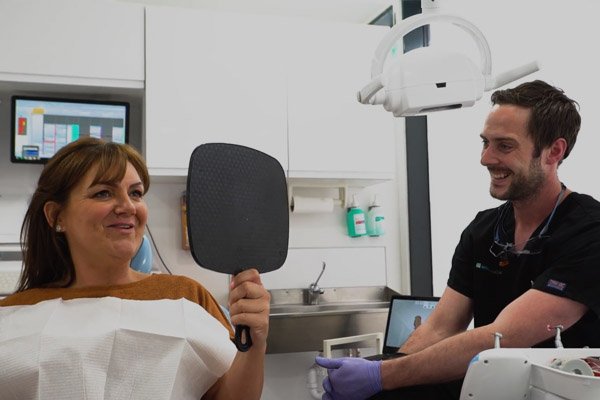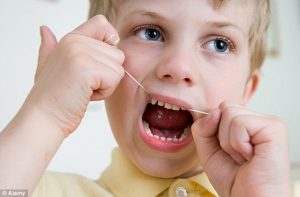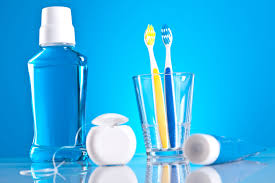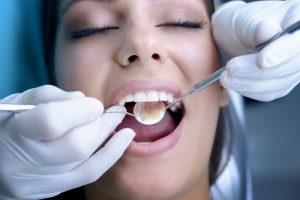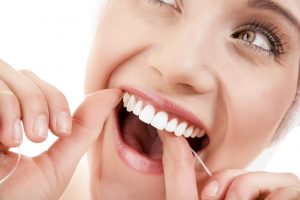Archive for the ‘Dental Health & Tips’ Category
Dental Tips For Halloween
Monday, October 30th, 2017
Halloween is an increasingly popular celebration in the UK, and it’s easy to see why. The 31st of October is filled with fun costumes, spooky events, and every child’s favourite activity: trick or treating. Trick or treating has been a feature of Halloween for many years, with the nation’s kids going door to door and receiving bucketsful of sweets and chocolate from neighbours. Often, they will end up with a huge bounty of goodies that may taste delicious but are unhealthy and bad for teeth. However, it is possible to enjoy Halloween without causing lasting damage to teeth; just read Brite Dental’s handy guide.
Halloween Treats: Not So Sweet For Teeth
Sweets and chocolate are some of the main causes of tooth decay and poor oral health in children. Sugar in these treats can affect the bacteria in our mouths. We have both healthy and harmful bacteria, and some of these harmful bacteria feed on sugar to form acids. In turn, these acids destroy the tooth enamel which protects the inside of the tooth, leading to tooth decay. Some of the worst sweets for your teeth include chewy sweets, as their sticky texture will stay on the surface of the tooth for longer, and sour sweets, as they contain additional acids.
What Problems Does Tooth Decay Cause?
Tooth decay can cause a variety of problems, from pain all the way through to the loss of a tooth. There are many symptoms of tooth decay, from sensitivity and toothache through to black or brown spots on the tooth and bad breath. If tooth decay is caught very early, dietary changes and fluoride gels may help. After that, a filling may be needed. For severe cases, a root canal treatment may be performed, or even an extraction of the whole tooth if it is too damaged to be saved.
How To Keep Teeth Healthy
Here at Brite Dental, we have lots of advice to help keep fillings at bay, even during the Halloween festivities. The main way is to make sure teeth are brushed twice a day with a toothpaste that contains fluoride. Flossing every day is a necessity, and after eating sticky, sweet food, make sure to rinse with water to remove some of the debris from the surface of the tooth. It can also help to eat sugary foods at mealtimes. In terms of alternatives, there are lots of ways to avoid large amounts of sugar. It’s easy to make your own Halloween treats with reduced sugar, such as chocolates with artificial sweetener. There are also plenty of sweets for sale in supermarkets that use sweeteners instead of sugar. You can also substitute refined sugar from natural sugars from fruit and honey; honey can still be bad for teeth, but it contains more complex sugars so takes longer for your body to break down. This means you have more time before the bacteria begin multiplying in your mouth.
If you are worried you or your children may have overindulged this Halloween or you simply want to book in for a thorough check up, drop us a line at your local Brite Dental branch today.
The Best Food For Strong, Healthy Teeth
Friday, May 26th, 2017

We often think of our diet as affecting only our bodies. Eating fewer fatty foods means we’ll lose a few pounds, whilst eating more protein will boost our strength. However, diet is extremely important for our teeth as well as our bodies, and there are particular foods we should be eating that are especially good for teeth
National Smile Month is the UK’s largest and longest-running campaign to promote good oral health. It has a particular focus on how important diet is for healthy teeth, emphasizing the point that healthy food is not just good for our bodies, but also improves the health and strength of our teeth.
One of the key messages this campaign highlights is to cut down on sugary foods and drinks. So, we thought it would be a good idea to put together some tips on how you can do just that!
We’ve also included a list of foods that are extremely good for our teeth and have provided advice on how to enhance the strength of your teeth by eating the right kind of foods. Read below to find all the information you need for creating the perfect diet for healthy teeth.
The importance of diet for healthy teeth
The foods you eat affect your teeth and gums as well as your overall health. A poor diet can lead to tooth decay and gum disease. Foods high in carbohydrates, sugars and starches greatly influence the production of plaque acids that attack the tooth enamel. Eventually, these acids can cause tooth enamel to break down, causing the formation of a cavity.
Sugary foods can also contribute to tooth decay. Almost all foods, including milk and vegetables, contain some type of sugar, however, these foods are a necessary part of a healthy diet as they also contain important nutrients.
Therefore, it’s important to strike the right balance between naturally sugary foods, such as fruits and vegetable, whilst cutting down or entirely avoiding foods and drinks with added sugars. Typical and popular sugary foods include fizzy drinks, fruit juice, energy drinks, sweets, biscuits and pastries.
By creating and sticking to a balanced diet that is rich in vitamins, minerals, fresh fruit and vegetables will help protect your tooth enamel and prevent long-term problems such as tooth decay and gum disease. However, If your diet lacks certain nutrients, teeth can become weaker, more prone to decay, and the tissues in your mouth and gums will be less able to resist infection.
The best food groups for strong teeth
Most of us are aware of the importance of good oral hygiene habits and try to maintain a regular brushing and flossing routine, however, often we forget about the impact food can have on our teeth.
To help our patients eat the best food for strong teeth, we’ve included a list of everyday foods that can help improve the health and strength of your teeth, as well as having a positive impact on your overall health and fitness; A win-win situation!

Apples
Apples are full of vitamins and the skin of the apple scrubs against your teeth which helps remove plaque and stains. Furthermore, they are great for getting rid of bad breath as the acidity of the apple helps kill any bad bacteria that may be the cause of this.
Green Vegetables
Spinach, lettuce and other leafy green vegetables come with a huge variety of health and dental benefits. As well as antioxidants and iron, they are full of beta- carotene which helps keep tooth enamel strong.
Fish
Fatty fish such as salmon and tuna contain omega-3 fats which break down the inflammation that occurs when bacteria irritate gums. They also provide us with minerals and vitamin D which are key components to strong teeth and jaw bones.
Healthy Snack Options
Drinking plenty of water and eating a well-balanced diet will help keep your smile healthy. If you choose a snack, choose nutritious foods such as low fat and fat-free dairy foods like cheese and yoghurt. Nuts and raw vegetables are also tooth friendly snacks.
What to do if your teeth are already damaged?
If you have not stuck to a healthy diet in recent years and are suffering from cavities, tooth decay, gum disease, pain or even tooth loss, do not lose hope of achieving a happy and healthy smile!
There are now many cosmetic dental procedures that can help to improve both the aesthetic look, strength and health of your smile. Some of the best cosmetic options for improving the strength and health of your teeth include:
- Root canal treatment – used if you have severe tooth ache caused by an abscess or tooth decay.
- Airflow treatment – this treatment helps improve the look and health of your teeth. Airflow therapy removes persistent stains on the teeth and helps get rid of plaque and discolouration by using a combination of water, compressed air and fine powder particles.
- Dental implants – perfect if you have suffered from tooth loss or extraction. Dental implants will improve your overall oral health and give back strength to your bite.
- Orthodontics – orthodontic treatment is primarily for straightening teeth, but procedures can also help improve oral health and strengthen teeth.
If you are more focused on improving the aesthetic look of your smile, you might consider:
- Professional teeth whitening to get rid of stains and enhance your shade of white
- Composite bonding to cover up imperfections such as cracks, gaps and marks. Composite bonding also adds extra strength to your teeth!
- Veneers, which are designed for covering the outer surface of your teeth in order to improve the strength and appearance of your smile.

Creating happy, healthy smiles at Brite Dental
If you are serious about your oral health and truly want to improve the health and strength of your teeth, then it’s essential that you visit your dentist regularly. Attending regular dental check-ups will help identify issues before they become serious, which leads to better overall oral health and will contribute to maintaining strong, healthy teeth for longer.
Your dentist will also give your personalised advice on diet, oral health habits and relevant procedures that will help improve your smile and health.
Brite Dental was created by an award-winning team of dentists and dental care professionals to provide you with the best level of dental care available today.
Register at one of our four practices today to book an appointment, or simply get in touch for further advice and tips for improving your diet and your oral health.
Brite Dental – National Smile Month
Tuesday, May 16th, 2017
What Is National Smile Month?
Here at Brite Dental, we are passionate about great oral health, and that’s why we are happy to support National Smile Month. From the 15th May-15th June 2017 dentists and orthodontists around the country, along with various other organisations, are placing a focus on the importance of oral hygiene and of taking great care of your teeth. It is the longest-running and largest campaign of its type in the UK.
The history of National Smile Month
The campaign has been running since 1977, and since that time is has continued to grow and gain more support. It was designed to improve communication between dentists and their patients, and to improve the oral health of the nation. The campaign has also expanded to the USA and makes a huge impact on social media. Over 60 million people took part worldwide in 2016.
Why is National Smile Month important?
Great dental health should always be a priority. Not only does it keep your smile looking great but it keeps your mouth healthy which can also affect your overall health. The campaign does vital work in encouraging people to keep up-to-date with regular dentist appointments. The old phrase ‘prevention is better than a cure’ is still true, and regular dentist visits can flag up any issues with your teeth and gums, so that they can be treated before progressing and causing further issues. The friendly and professional Brite team are on hand to book you an appointment to kick-start your National Smile Month.
What are the main goals of National Smile Month?
As well as encouraging patients to see their dentist more often, the campaign also focuses on all-round dental health. One element of this is inspiring everyone to brush their teeth twice a day with a fluoride-based toothpaste, to fight tooth decay and minimise the need for dental treatments such as fillings. They encourage everyone to floss, and to try to stop smoking. Another element of the campaign is to get people to cut down on the amount of sugary foods and drinks they consume, a leading cause of tooth problems, and even tooth loss. The Brite group can help to give you other great tips, such as information about sugar-free options, when and how to brush your teeth, and what acidic foods to avoid.
National Smile Week also wants to educate the nation about good gum health. The campaign provides lots of information about how the health of your mouth and gums can affect your overall health, such as the link between unhealthy gums and strokes, heart disease, and diabetes. It is important to see your dentist if you notice any tell-tale symptoms such as inflammation, loose teeth, bad breath, or blood when you brush your teeth.
At Brite Dental, our friendly care team are always at hand to care for your dental needs, don’t wait until a problem arises, make your next dental check- up today and let us do what we can to identify and prevent any dental issues.
Signs You Should See Your Dentist
Monday, May 8th, 2017
Why Is It Important To See Your Dentist?
Regular dental check-ups are vital for maintaining the best oral health. Your smile is one of the first things anyone notices, and keeping it healthy and beautiful is important. Small aches and pains may not appear serious, but with time they can progress, leading to serious problems such as tooth decay and gum disease. So, when you notice something wrong with your teeth or gums, make sure to book an appointment at the Brite group as soon as possible.
Signs That Something May Be Wrong
Some of the most common signs of problems with your teeth or gums may be:
- Swollen or bleeding gums
- Teeth that are sensitive to hot or cold, or to sweet foods
- Pain or swelling around a tooth
- Wisdom teeth issues
- Jaw pain
- Loose fillings, crowns, bridges, or dentures
- You have an ongoing medical condition such as diabetes
- Changes to our life such as pregnancy or cancer treatment
Another reason to see your dentist may be more psychological than physical. The appearance of your teeth, such as their colour or if they are uneven or crooked, may make you feel unhappy with how you look. The Brite team is on-hand to offer a range of cosmetic treatments that can help you to feel confident again. These include teeth whitening, dental implants, invisible braces and many more.
Even if you don’t have any current issues, regular check-ups are still really important. If you visit as much as your dentist thinks is necessary (this can vary from person to person, depending on your oral health) they can spot any potential problems early on, and can offer treatment to stop tooth decay or gum disease from progressing.
What Could Happen If You Don’t See Your Dentist?
Tooth decay and gum disease can lead to serious issues if not treated. Without help from a dentist, these conditions will progress and worsen over time, until teeth become weak and loose. They may also cause you severe pain which can be eased with a dental visit. Acute conditions such as infections also need immediate treatment in order to keep your mouth in the best condition. Dental hygiene is important for staying in good health.
Keep Putting Off Your Visit? Don’t Worry, We Can Help
If you think you may have a cavity or a loose tooth filling, but you’re nervous about going to the dentist, don’t panic! Brite Dental has a friendly, qualified team that will help you to relax and make it through your appointment in a pain-free, calming environment. The Brite team will take time to evaluate your needs and will take into consideration the bigger picture, addressing any worries before treatment starts. Our experienced team will then put together an individualised treatment plan. So contact us today to book your next appointment.
How To Maintain Your Kid’s Oral Health
Tuesday, May 2nd, 2017
As you get older you begin to realise how important your oral health is and often wish that you had taken better care of your teeth when you were younger. That is why it is important for you to be aware of how to provide your children with good dental care.
Oral Hygiene Begins Before Teeth Are Showing
Just because you can’t see them doesn’t mean they aren’t there! Many people are unaware that teeth are fully developed in your baby’s jaw at birth, which is why your focus should be on your baby’s gums for the first 6 months. You can look after your baby’s gums by using a clean, lukewarm washcloth to wipe bacteria off the gums a few times a day. When your baby’s first little teeth begin to appear, use a soft- bristled toothbrush and water to clean your baby’s teeth. By the time your child turns 2, you should begin teaching them how to spit after brushing to avoid them swallowing any plaque and to prepare them for spitting out their toothpaste. Ask your dentist when to introduce toothpaste to your child, this is normally when they are around two years old. You should use a pea sized amount of toothpaste that is low in fluoride.
Regular Check-ups
Having regular dental check-ups will not only help identify any problems early but will also prevent the fear associated with dental visits. You can also help your infants learn that the dentist is not a figure to be afraid of by reading them child friendly dental books as this will give them a more positive view of going to the dentist. Parents can play a vital role in encouraging their child’s overall oral health.
Teach Your Children the Right Technique
When your child turns 3, you should teach them proper brushing techniques, we have all seen both children and adults vigorously brushing their teeth as quickly as they can. This is not a constructive method of brushing and can often lead to more damage than good. The toothbrush should be moved in a back- and- forth motion with short strokes along the teeth and gums. It is important to teach your child the correct brushing technique so that they can protect their gums and target the most bacteria as possible. Whilst brushing for 2 minutes is the recommended amount, this is not realistic for young children, so put emphasis on this to prolong the brushing process as much as possible.
Children and Flossing
Flossing is one of the most neglected components of oral hygiene, despite it being one of the most important. To set a good example for your child, you should adopt flossing in to your daily routine as this will prepare them for when their tooth surfaces are next to each other and they can start flossing themselves. Flossing should be adopted as a consistent dental care routine as using dental floss removes plaque and excess food particles that you may not be able to target with just your toothbrush.
Providing your children with good oral care will kick them off to a good start and increase their likeliness to establish the best dental habits. Thus, keeping them as healthy and happy as possible. At Brite Dental, we are part of the Childsmile programme, so register your little ones today!
Top Tips For Caring For Your Teeth
Monday, March 20th, 2017
Today is World Oral Health Day and Brite Dental have put together some useful tips to help you maintain good oral health.
Brushing Your Teeth
It is recommended that you brush your teeth at least two times a day. Ideally do this first thing in the morning to eliminate bad breath, and then brush at night time before bed. This is particularly important as you produce less saliva during the night, leaving the mouth more at risk from decay. To ensure you do a thorough clean and remove plaque, you should brush your teeth for two minutes, twice a day. Make sure not to brush your teeth right after consuming sugary or acidic foods as sugar and acids weaken the enamel on your teeth, therefore brushing straight after can cause tiny particles of enamel to be brushed away. So, it is best to brush your teeth at least one hour after eating.
What Oral Care Products Should I be Using?
Every one’s mouth is different, at Brite Dental our care team can recommend the best toothbrush and toothpaste for you to use, as well as the best way to target the tricky areas between your teeth. Dental floss is an essential product that can help do just that. Flossing should be done once a day as it helps rid food particles that get trapped between your teeth. We also recommend that you use a fluoride toothpaste as fluoride can help your dental hygiene by strengthening the tooth enamel, making it more resistant to tooth decay.
What Products Can I Use To Prevent Bad Breath?
The most important way of controlling bad breath is with good brushing and flossing. Sugar free chewing gum and rinsing with antibacterial mouthwash can also help eliminate bad breath. Chewing sugarless gum will not only keep your breath smelling fresh but it also promotes the production of salvia which acts as a natural defence against acid.
However, long term bad breath could be a potential symptom of a dental problem such as gum disease, so if you are concerned about this, you should ask the Brite Dental team for advice.
Diet And Your Oral Health
Diet can have a big impact on your oral health, there is no escaping the damage a poor diet can have on your teeth. Cutting down on sugary or acidic foods or drinks will decrease your chances of tooth decay and discolouration.
Schedule Your Next Appointment At Brite Dental
Our dentists are committed to the health and longevity of your teeth. We encourage you to pay close attention to your oral health and practice excellent maintenance habits to prevent future problems and address any existing damage. Get in touch today with your local Brite practice and our professional team will take good care of you and help you maintain optimal oral hygiene.
Wisdom Tooth Pain: Are Your Wisdom Teeth Causing You Bother?
Wednesday, January 18th, 2017
Unfortunately, for many teens and adults across the UK, wisdom teeth can cause a lot of pain and discomfort to every day life.
If you’re one the unlucky souls experiencing wisdom tooth pain, you should make an appointment with your dentist to get the issue solved quickly and effectively.
Upon booking an consultation with the Brite Dental team for any wisdom tooth pain you are experiencing, your appointed dentist will check the condition of your wisdom teeth and advise you on the best course of action to get the problem solved.
In most cases, a quick X-ray of your mouth will give a clear idea of which wisdom teeth need to be removed and which teeth can be attended to with more everyday remedies, like antibacterial mouthwashes and advanced teeth and gum cleaning.
To find out more about wisdom tooth extraction and the common issues that wisdom teeth can cause, please read the helpful information laid out below.
Wisdom Tooth Infection: Common Wisdom Teeth Complaints
Wisdom teeth don’t always cause problems, as sometimes there will be enough space for them to come through in a convenient position.
However, for many, wisdom teeth can cause a lot of discomfort and they can cause severe dental problems further down the line. If a wisdom tooth is impacted and hasn’t fully broken through the gum, more serious complaints can fester. These include
-
Tooth decay
-
Gum disease
-
Pericoronitis (wisdom tooth infection)
-
Severe gum pain
In more extreme cases, a problematic wisdom tooth can trigger bacterial infections of the tongue, throat or cheek, while abscesses can form due to infection. In the rare case that a wisdom tooth hasn’t properly broken through the gum, cysts can form.
Avoid these painful risks by going for a regular dental check ups or contacting your dentist if any pain or swelling becomes apparent.
How Can I Reduce The Discomfort Of Wisdom Teeth?
If you experiencing wisdom tooth pain, there are a few at-home steps you can take to minmise the discomfort.
Rinsing your mouth with warm water and a teaspoonful of salt will help ease gum soreness and inflammation. Rinsing with salt water several times a day will help target areas you cannot reach with your toothbrush.
To relieve pain you can also take paracetamol or ibuprofen if you feel this is necessary.
However, if the pain is on-going and only getting worse, it is highly recommended that you speak to your dentist and have the issue of wisdom tooth pain dealt with by a professional. One common treatment for alleviating wisdom tooth pain is wisdom tooth extraction.
Wisdom Tooth Extraction: What is it & How Does it Work?
Wisdom tooth extraction is a very common procedure that does not pose any significant health or safety risks. It is the process of removing the wisdom tooth (or teeth) that are causing you pain, freeing up space in your mouth for all of your teeth to sit comfortably and in-line with one another.
In most instances of wisdom tooth extraction, your dentist will apply a local anaesthetic before moving on to the procedure itself.
If you’re having multiple or all your wisdom teeth removed, your dentist may use a stronger anaesthetic to ensure as little discomfort as possible during the procedure. For more anxious and nervous patients a sedative can be used to relax you.
Often, a small cut needs to be made into the gum tissue itself, freeing up the problem wisdom teeth for extraction. Particularly troublesome teeth may need to be broken up in to smaller pieces to ensure a total extraction.
Rest assured that your Brite Dental dentist will handle this procedure with as much care as possible and the long-term relieve will far outweigh any short term pain or fear.
Why It Is Important To Get Your Wisdom Teeth Removed?
Although many patients are reluctant to turn to their dentist for wisdom tooth extraction, the procedure is essential for ensuring optimum dental health.
When trapped or impacted teeth are removed, you’ll be able to chew more easily and alleviate yourself of the swelling and discomfort caused by erupting teeth.
What’s more, when wisdom teeth are left unchecked, they can damage the teeth immediately around them. These changes to your molars can become more noticeable over time and can lead to even more costly cosmetic procedures down the line.
If you’re suffering from on-going wisdom tooth pain, get in touch with the Brite Dental team today to discuss your options and book an appointment with our first-class clinical team.
Essential Dental Hygiene Tips For The Festive Period
Monday, December 12th, 2016
Even for those that maintain the most meticulous of dental hygiene routines, Christmas and the festive period can be a real challenge. You might be more concerned about what all those mince pies, turkey sandwiches and sugary sweets will be doing to your waistline, but one of your key concerns when it comes to your festive diet is in the impact it can have on your teeth. As you kick back and relax, your usual oral hygiene routine can fall behind schedule too, making those festive feasts all the more of a risk to a healthy smile.
The high-risk period between Christmas Eve and Boxing Day can really take its toll on your teeth and can leave lasting damage, from encouraging cavity formation, to contributing to tooth decay. Worse still, the height of the party season is one of the trickiest of times to track down a dentist should something more serious occur and you need emergency treatment pronto. To help safeguard your teeth against immediate and long-term dental problems, the Brite Team have put together an essential checklist for the Christmas break.
1. Don’t Fall Behind On The Basics
Any break from the usual routine can be an excuse to slack, but you should never cut corners when it comes to dental hygiene. Throughout the Christmas period, people tend to indulge. Although many expect to pile on a few pounds due to festive feasting, most overlook what that constant exposure to sugary and acidic foods is doing to their teeth. If you brush regularly after eating, bear in mind that you’ll need to work around mealtimes that are different from the usual. It’s also worth remembering that many of us celebrate the big day itself away from our own homes. If you’re heading to friends or family for your Christmas Day dinner, make sure you’re packing your toothbrush to fit in an essential bit of brushing maintenance after you’ve eaten your own body weight in turkey, sprouts and stuffing.
2. Watch Out For Sugary Foods
Our sugar intake shoots right up during the festive period due to all those sweet sauces, desserts and puddings. Even if you go easy on the pudding, the traditional main course itself is loaded up with things like cranberry sauce and other sugary condiments. Even the most harmless looking of ingredients can be seriously bad for your teeth. Don’t overlook how much sugar is packed into that dried fruit in your Christmas pudding, and keep an eye on the amount of sweetened soft drinks and alcoholic beverages you’re consuming.
3. Mix Up Your Meal Plan
Sometimes, the draw of a delicious trifle, pudding or mince pie is too much to resist. It’s fine to treat yourself during your Christmas break, but if you’re looking to cut out a few risk factors to your teeth, consider swapping out some of the sugar for other delicious alternatives. The humble cheese board is a stalwart of Christmas dinner tables and it’s a great go-to if you’re looking to indulge a little, without the worry of what you’re doing to your teeth.
Just a few little changes will ensure that your teeth emerge from December and into January with as clean a bill of health as possible. If you wish to discuss arranging a consultation with one of our dentists, or require more information about available dental treatments and plans, you can drop us a message via our online enquiry form. Prefer to speak to someone in person? Find the phone number of your nearest Brite Dental branch on our Contact page.
How To Avoid Cavities
Wednesday, November 2nd, 2016
Cavities are the most common problems dentists see. Left untreated they lead to tooth decay, gum disease or even health problems. At Brite Dental, we care that you have healthy teeth and a healthy smile so we’ve put together a few tips about cavities and how to avoid or treat them.
What Is A Tooth Cavity?
Tooth cavities simply mean holes in teeth. Our mouths are full of harmless bacteria but sometimes these attach themselves to the hard enamel surfaces of teeth and multiply rapidly. Once mixed with proteins in saliva, bacteria become the whitish plaque that we see around our teeth. If this isn’t removed the acid in it causes tooth decay, tooth cavities and gum disease as it dissolves your tooth enamel. Once tooth cavities have allowed bacteria access to the dentin inside your tooth, pain sets in and you will need a tooth filling to prevent further tooth decay or gum disease.
How Can I Avoid Tooth Cavities And Gum Disease?
Gentle, but thorough brushing of your teeth and gums twice a day is your first line of defence against developing a tooth cavity or gum disease. Use gentle back and forth movements, remembering to brush your tongue as well. Daily flossing adds an extra level of defence against developing a cavity, letting you remove food particles your toothbrush couldn’t reach. Finish your dental routine with an antibacterial mouthwash. Designed to fight bacteria they also leave you with fresh smelling breath. Limiting your intake of sweet food and drink is also very important as sugars react with the bacteria in plaque producing the harmful acids that lead to tooth cavities. If you do indulge in a treat remember to brush afterwards. Finally, regular check-ups at Brite dental enable our team to deal with small problems before you need a tooth filling or suffer more serious damage to your teeth and gums.
How Does The Brite Group Treat Cavities?
There are four main stages to cavity treatment with the aim of dealing with it before further tooth decay and gum disease sets in. When a cavity first appears we offer advice on diet and a fluoride covering may be applied to the area. A tooth filling may be needed to remove the decay and the cavity left behind filled with a safe substance. Don’t worry, a tooth filling is always carried out under local anaesthetic. If your tooth cavities have spread into the pulp or centre of the tooth then this may need to be removed. This root canal treatment prevents further tooth decay and the risk of gum disease. If the damage is too severe for a tooth filling, then teeth may need to be removed. Our Brite team will advise on this and how missing teeth can be replaced with partial dentures, bridges or implants.
Remember regular check-ups at Brite Dental will ensure we get to problems before the pain starts, a tooth filling is needed or gum disease sets in. So what are you waiting for? Contact your local Brite Dental today and we can help you look after your smile.
Your Checklist For A Healthy Smile
Monday, June 13th, 2016
To help maintain a healthy mouth, Brite Dental have made a daily checklist with some handy tips.
1. Brush Your Teeth Twice A Day For 2 Minutes
Brushing your teeth twice a day, in the morning and before you go to bed, is absolutely vital for keeping them healthy. Not only does brushing eliminate food particles and plaque from the mouth, but it prevents gum disease, tooth decay and bad breath. The recommended time of 2 minutes helps ensure that you are not rushing through the process and that all the teeth are clean. Always use gentle back and forth motion across your teeth and gum line when brushing.
2. Brush At Least 30 Minutes After Eating
After consuming acidic or sugary foods you should wait at least 30 minutes before brushing your teeth as this allows enough time for your saliva to neutralise the food acids. Theses acids are found in most foods and can be harmful to your tooth enamel as the acid contained in the food temporarily softens the enamel as these foods interact with the plaque in the mouth. Brushing directly after the consumption of such foods will cause further damage to the teeth surface. Don’t neglect your tongue! brushing your tongue helps remove plaque and bacteria that sticks to the surface which in turn can help fight bad breath.
3. Floss Once A Day
Many people forget this one! Flossing your teeth makes all the difference, it helps get rid of food particles that get stuck between your teeth that you cannot reach when brushing. It plays an important role in helping maintain good oral hygiene and preventing gum disease. Care must be taken when flossing to avoid irritating your gums which can often result in bleeding. Just ask at your local Brite, we would be more than happy to demonstrate how you can floss effectively.
4. Rinse With Antibacterial Mouthwash
Rinsing your mouth with antibacterial mouthwash after brushing is strongly recommended. Not only does it help remove plague and refresh your breath but can also help prevent tooth decay and gum disease.
5. Chew Sugarless Gum
Brushing your teeth after every meal is not very practical, plus over brushing can damage your enamel. So we advise chewing sugarless gum after eating. This will help to keep your breath smelling fresh but chewing also encourages the production of saliva which acts as a natural defence against acid. This also washes away food particles, helping to keep your teeth clean.
6. Limit Your Intake Of Sugary Foods And Beverages
We all enjoy indulging in sugary snacks every now and again, however consuming these too often can affect the whiteness of your smile and the freshness of your breath. What’s more of a concern is a poor diet can also lead to tooth decay and gum disease. This is due to the sugar reacting to bacteria in the plaque (the sticky layer on your teeth) and producing harmful acids. These acids then attack the teeth and destroy the enamel which can result in a cavity or hole forming.
Schedule Your Next Dental Appointment At Brite Dental
Incorporating these things into your daily routine will help you maintain a healthy smile. You should also remember to replace your toothbrush regularly. This should be done every 3 to 4 months or when the bristles start to look worn. Don’t forget to visit your dentist regularly; frequent check-ups are essential, so why not contact us and book your next appointment at Brite Dental?

